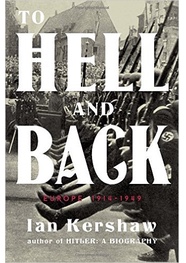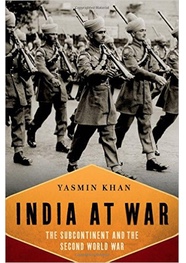NYT History Book Reviews: Who Got Noticed this Week?
Book: To Hell and Back: Europe 1914-1949
Summary (Via Amazon): "The European catastrophe, the long continuous period from 1914 to 1949, was unprecedented in human history—an extraordinarily dramatic, often traumatic, and endlessly fascinating period of upheaval and transformation. This new volume in the Penguin History of Europe series offers comprehensive coverage of this tumultuous era. Beginning with the outbreak of World War I through the rise of Hitler and the aftermath of the Second World War, award-winning British historian Ian Kershaw profiles the key decision makers and the violent shocks of war as they affected the entire European continent and radically altered the course of European history. Kershaw identifies four major causes for this catastrophe: an explosion of ethnic-racist nationalism, bitter and irreconcilable demands for territorial revisionism, acute class conflict given concrete focus through the Bolshevik Revolution, and a protracted crisis of capitalism."
Author: Sir Ian Kershaw is a British historian and the author of an acclaimed two-volume biography of Hitler, Hubris and Nemesis. (He is currently working on a fourteen-volume series of Stalin called Pipes, Moustaches, and Bolshevik Ladies.) It’s set to be released in La La Land when Putin steps down as president.
Reviewer: Harold Evans is editor at large of Thomson Reuters and the author of “The American Century.” We don’t think he’s going to like the series of Stalin books, unless he has a Russian-looking moustache (not mustache, there’s a difference!) himself.
Reviewer highlights
“Ian Kershaw’s chilling epic-size history produces aftershocks connected to our current news headlines.
“[This book]should be required reading in every chancellery, every editorial cockpit and every place where peevish Euroskeptics do their thinking.
“Kershaw documents each and every ‘ism’ of his analysis with extraordinary detail and passionate humanism. He is as diligent in exploring the character of the men — no women to filter the macho posturing — as he is in analyzing the movements, notably the rise of a virulent nationalism based on ethnolinguistic identification rather than territory.”
Erik Moshe Comments: Here's an excerpt from Dante Aligheri's The Divine Comedy.
A piece of the sampled section: “The feign’d heifer” is a cross between "the famed Hitler" and "the veined heffer." But don't tell anybody because it's most likely inconclusive, although Hitler did like throwing tantrums, particularly about odd programs on The History channel.
Book: Workshops of Empire: Stegner, Engle, and American Creative Writing during the Cold War
Summary (Via
Amazon):
“During and just after World War II, an influential group of
American writers and intellectuals projected a vision for literature
that would save the free world. Novels, stories, plays, and poems,
they believed, could inoculate weak minds against simplistic
totalitarian ideologies, heal the spiritual wounds of global
catastrophe, and just maybe prevent the like from happening again. As
the Cold War began, high-minded and well-intentioned scholars,
critics, and writers from across the political spectrum argued that
human values remained crucial to civilization and that such values
stood in dire need of formulation and affirmation. They believed that
the complexity of literature—of ideas bound to concrete images, of
ideologies leavened with experiences—enshrined such values as no
other medium could.
“Creative writing emerged as a graduate
discipline in the United States amid this astonishing swirl of grand
conceptions. The early workshops were formed not only at the time of,
but in the image of, and under the tremendous urgency of, the postwar
imperatives for the humanities. Vivid renderings of personal
experience would preserve the liberal democratic soul—a soul
menaced by the gathering leftwing totalitarianism of the USSR and the
memory of fascism in Italy and Germany.
“Workshops
of Empire
explores this history via the careers of Paul Engle at the University
of Iowa and Wallace Stegner at Stanford. In the story of these
founding fathers of the discipline, Eric Bennett discovers the
cultural, political, literary, intellectual, and institutional
underpinnings of creative writing programs within the university. He
shows how the model of literary technique championed by the first
writing programs—a model that values the interior and private life
of the individual, whose experiences are not determined by any
community, ideology, or political system—was born out of this Cold
War context and continues to influence the way creative writing is
taught, studied, read, and written into the twenty-first century.”
Author: Eric Bennettis an associate professor of English at Providence College in Rhode Island.
Reviewer: Timothy Aubry, an associate professor of English at Baruch College, is the author of “Reading as Therapy: What Contemporary Fiction Does for Middle-Class Americans.”
Reviewer highlights
“Bennett’s argument is a persuasive reminder that certain seemingly timeless criteria of good writing are actually the product of historically bound political agendas, and it will be especially useful to anyone seeking to expand the repertoire of stylistic strategies taught within creative-writing programs. That said, some sections are better researched than others.
“...despite Bennett’s misgivings about creative-writing workshops, his book is itself a convincing argument in their favor. A graduate of the Iowa M.F.A. program, Bennett has produced a literary history far more enjoyable than the typical academic monograph, for all the reasons one might guess. It features a winning protagonist, Engle, the ebullient poet-huckster and early director of the Iowa Writers’ Workshop, who, according to Bennett, “moved too quickly through the airports and boardroom offices to bother with the baggage of complex beliefs.” Here and elsewhere, Bennett never tells when he can show.”
Erik Moshe Comments: My creative writing teacher from college was a dusty, ancient looking woman who was always cranky for some reason. I'm sure this book will offer much more valuable information about creative writing than she did! Creative comment, I know! Also, be sure to check out The What-if Question Genie, who will come in handy when you need an idea for a story. Just don't rub him the wrong way.
Book: India At War: The Subcontinent and the Second World War
Summary (Via
Amazon):
“World War II was a global catastrophe. Far broader than just the
critical struggle between Allies and Axis, its ramifications were
felt throughout the world. It was a time of social relocation,
reorienting ideas of patriotism and geographical attachment, and
forcing the movement of people across oceans and continents. In India
at War,
Yasmin Khan offers an account of India's role in the conflict, one
that takes into consideration the social, economic, and cultural
changes that occurred in South Asia between 1939 and 1945-and reveals
how vital the Commonwealth's contribution was to the war effort.
“Khan's work centers on the lives of ordinary Indian
people, exploring the ways they were affected by a cataclysmic war
with origins far beyond Indian shores. In manpower alone, India's
contribution was staggering; it produced the largest volunteer army
in world history, with 2.5 million men. Indians were engaged in
making the raw materials and food stuffs needed by the Allies, and
became involved in the construction of airstrips, barracks,
hospitals, internee camps, roads and railways. Their lives were also
profoundly affected by the presence of the large Allied army in the
region, including not only British but American, African, and Chinese
troops. Madras was bombed by the Japanese and the Andaman and Nicobar
Islands were occupied, while the Bengal famine of 1943-in which
perhaps three million Bengalis died-was a man-made disaster
precipitated by the effects of the war.”
Author: Yasmin Khan is an Associate Professor of History at the University of Oxford and a Fellow of Kellogg College. Her first book, The Great Partition: The Making of India and Pakistan, won the Gladstone Prize for History from the Royal Historical Society.
Reviewer: Ramachandra Guha is the author of “Gandhi Before India."
Reviewer highlights
“She writes movingly...
“Khan’s book is particularly informative about the profound demographic shifts of the war years.”
Erik Moshe Comments: Was Churchill Responsible for the Bengal Famine?
In World War I, India contributed with more soldiers than Australia, Canada, New Zealand and South Africa combined.
Book: Clementine: The Life of Mrs. Winston Churchill
Summary (Via
Amazon):
"By Winston Churchill’s own admission, victory in the Second
World War would have been 'impossible without her.' Until now,
however, the only existing biography of Churchill’s wife,
Clementine, was written by her daughter. Sonia Purnell finally gives
Clementine her due with a deeply researched account that tells her
life story, revealing how she was instrumental in softening FDR’s
initial dislike of her husband and paving the way for Britain’s
close relationship with America. It also provides a surprising
account of her relationship with Eleanor Roosevelt and their
differing approaches to the war effort.
"Born into
impecunious aristocracy, the young Clementine was the target of cruel
snobbery. Many wondered why Winston married her, but their marriage
proved to be an exceptional partnership. Beautiful and intelligent,
but driven by her own insecurities, she made his career her mission.
Any real consideration of Winston Churchill is incomplete without an
understanding of their relationship, and Clementine
is both the first real biography of this remarkable woman and a
fascinating look inside their private world."
Author: Sonia Purnell is a political reporter and historian.
Reviewer: Amanda Vaill is the author, most recently, of “Hotel Florida: Truth, Love, and Death in the Spanish Civil War.” She was featured in a BusinessInsider list of "100 biographies to read in your lifetime." Winston Churchill made the list. King Ashoka did not make the cut, to H.G. Wells’ dismay, I’m sure.
Reviewer highlights
“…thorough and engrossing (if occasionally overdramatized)
“…ironically in a book intended to celebrate Clementine’s own story, she presents that story largely in terms of Winston’s career. Perhaps this is inevitable.”
Erik Moshe
Comments:
How
Churchill's wife played a central role in winning the war by
smoothing over relations with other Allied leaders.
Book: The Catskills: Its History and How It Changed America
Summary (Via
Amazon):
“The Catskills (‘Cat Creek’ in Dutch), America’s original
frontier, northwest of New York City, with its seven hundred thousand
acres of forest land preserve and its five counties—Delaware,
Greene, Sullivan, Ulster, Schoharie; America’s first great
vacationland; the subject of the nineteenth-century Hudson River
School paintings that captured the almost godlike majesty of the
mountains and landscapes, the skies, waterfalls, pastures, cliffs . .
. refuge and home to poets and gangsters, tycoons and politicians,
preachers and outlaws, musicians and spiritualists, outcasts and
rebels . . .
“Stephen Silverman and Raphael Silver tell of
the turning points that made the Catskills so vital to the
development of America.”
Authors:
Stephen M. Silverman is a twenty-year veteran of Time Inc. and was
the founding editor of People.com. Raphael D. Silver was a
real-estate developer.
Reviewer: Nicholas Lemann is the Pulitzer-Moore professor of journalism at Columbia University and a staff writer for The New Yorker.
Reviewer highlights
“…handsomely illustrated…
“…a collection of brightly written chapters about interesting people…
“Silverman and Silver are interested in famous naturalists — they have a lively section on John Burroughs, the white-bearded sage whose books on the Catskills made him an unlikely celebrity in the early 20th century — but not so interested in nature.
“Everyone’s always predicting that the Catskills are going to make a comeback. They’re beautiful, inexpensive, accessible, and, as Silverman and Silver demonstrate, rich in historical interest.”
Erik Moshe Comments: Taken from a Catskill Jewish Humor compilation: "Short summary of every Jewish holiday: They tried to kill us. We won. Let's eat."
For Further Reading: Ancient India - The British Museum
Readers…
What would YOU like to see investigated, mentioned, or scrutinized in greater detail in the next editions of NYT History Book Reviews: Who Got Noticed This Week? Shoot me an e-mail at Moshe1@mail.broward.edu, or fax me a colorful insult in Morse code.




